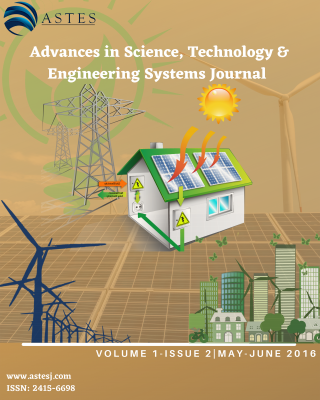Volume 1, Issue 2, May-June 2016

Download Complete Issue
Current Issue features key papers related to multidisciplinary domains involving complex system stemming from numerous disciplines; this is exactly how this journal differs from other interdisciplinary and multidisciplinary engineering journals. This issue contains 3 accepted papers in renewable energy and automation domain.
Editorial
Front Cover
Adv. Sci. Technol. Eng. Syst. J. 1(2), (2016);
Editorial Board
Adv. Sci. Technol. Eng. Syst. J. 1(2), (2016);
Editorial
Adv. Sci. Technol. Eng. Syst. J. 1(2), (2016);
Table of Contents
Adv. Sci. Technol. Eng. Syst. J. 1(2), (2016);
Articles
Solar Irradiance & On Grid Solar Power Systems with Net Metering in Pakistan
Haleema Qamar, Hafsa Qamar, Muhammad Umair Khan
Adv. Sci. Technol. Eng. Syst. J. 1(2), 1-5 (2016);
View Description
This paper presents a case study of solar irradiance and scope of on-grid solar power systems with net-metering in Pakistan. Detailed analysis of solar irradiance in Pakistan is being carried out by developing the dedicated solar excel sheets. The need of on grid solar power systems for the present energy crisis in developing countries like Pakistan is also discussed. It also presents the inclination of many countries especially USA and Europe towards it. Identification of barriers for implementing on grid net metered solar power systems in Pakistan along with solutions of these barriers is carried out.
Robust Controller Implementations for a Linear Pneumatic Actuator Interaction
Michail Papoutsidakis, Georgios Chamilothoris, Dimitrios Tseles
Adv. Sci. Technol. Eng. Syst. J. 1(2), 6-10 (2016);
View Description
Over the years, pneumatic systems have recorded a remarkable performance in automated applications, based on their cost to efficiency ratio and ease of energy transmission. Therefore, their drawback of not being totally controllable devices in terms of position accuracy, still represents a challenge task for engineers. In this paper, a traditional three term controller (PID) is designed for the task which is implemented in the system with an intelligent and not straightforward manner. The Integral term of the controller is not operating all the time during and parallel to the pneumatic piston stroke. The I-term will be switched ‘on’ and ‘off’, considering the system performance and needs. This ensures a robust control algorithm design, a faster system response and the avoidance of chattering around the demand position of the piston set point. In addition to this, an electrical board will be designed and produced in order to host all electronics like, a microprocessor, various amplifiers and converters, and a serial port for communication between the user and the system. An interface window is also implemented for the user to be able to export information of the system and record all data acquisition results as well as provide to an engineer a useful tool for re-programming the controller and download multiple versions of control code to the system. All results of the system performance are monitored and a representative pack of them are illustrated in the main body of this paper.
Energy Management and Simulation of Photovoltaic/Hydrogen/Battery Hybrid Power System
Tariq Kamal, Syed Zulqadar Hassan
Adv. Sci. Technol. Eng. Syst. J. 1(2), 11-18 (2016);
View Description
This manuscript focuses on a hybrid power system combining a solar photovoltaic array and energy storage system based on hydrogen technology (fuel cell, hydrogen tank and electrolyzer) and battery. The complete architecture is connected to the national grid through power converters to increase the continuity of power. The proposed a hybrid power system is designed to work under classical-based energy management algorithm. According to the proposed algorithm, the PV has the priority in meeting the load demands. The hydrogen technology is utilized to ensure long-term energy balance. The battery is used as a backup and/or high power device to take care of the load following problems of hydrogen technology during transient. The dynamic performance of a hybrid power system is tested under different solar radiation, temperature and load conditions for the simulation of 24 Hrs. The effectiveness of the proposed system in terms of power sharing, grid stability, power quality and voltage regulation is verified by Matlab simulation results.
https://oblakasalon.lt/lupu-putlinimas/ aukščiausios kokybės lūpų putlinimo paslauga paverčia tavo lūpas įspūdingu kūriniu už gerą kainą

